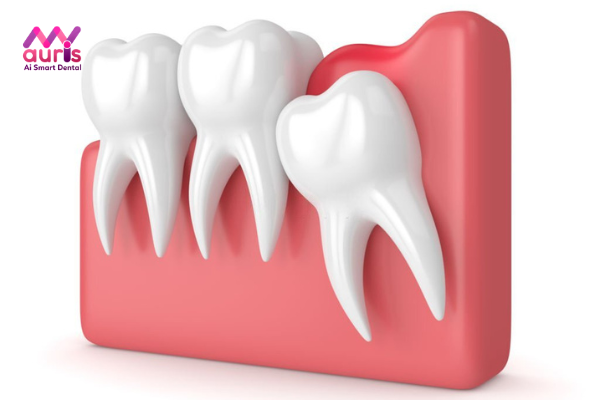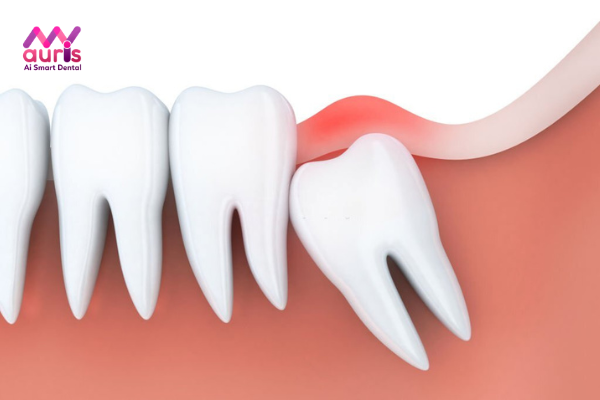What is swollen gums of wisdom teeth? What are the symptoms? Is swollen gums dangerous? How to treat swollen gums of wisdom teeth? You can refer to the article below!
Wisdom teeth are the last teeth to grow, when other teeth have developed. Therefore, when wisdom teeth grow, the gums around the teeth become swollen, red… accompanied by a feeling of pain and discomfort. These are common complications when wisdom teeth grow.
1. What is swollen gums of wisdom teeth?

Swollen wisdom tooth gums is a condition in which the tissue surrounding the wisdom teeth becomes inflamed. Often happens in the case of:
Wisdom teeth do not grow all the way through, but only partially. At this time, bacteria will penetrate around the tooth area, causing infection.
Swollen gums are also caused by food and plaque accumulating around the roots of the teeth, causing irritation of the gums. Over time, they will become red and swollen. If this condition lasts longer, the infection will spread beyond the jaw, then to the cheeks, neck…
2. Symptoms of swollen wisdom tooth gums
Swollen wisdom tooth gums will have different manifestations for each person. There are 2 levels of swelling of the wisdom tooth gums: acute and chronic, specifically:
-
Acute swelling of the wisdom tooth gums:
Shows: severe pain, swelling of the gum tissue. When chewing and swallowing, there is a feeling of pain, a slight fever, the area around the tooth secretes pus.
-
Chronic swelling of the gums of wisdom teeth:
Symptoms of chronic swelling of the wisdom teeth are: bad breath, mild pain, dull pain for 1 to 2 days… difficulty opening mouth when eating and speaking…
3. Are swollen wisdom tooth gums dangerous?

Swollen gums of wisdom teeth is a quite dangerous complication. At first, the symptoms are only mild: there is only pain and swelling around the teeth, affecting biting, tearing, chewing food, and pain when swallowing saliva. When more severe, it will spread from the inflamed wisdom tooth to other internal teethoral cavity.
In addition, if not treated promptly, bacterial infection, tooth abscess due to oral damage or blood infection will occur. Although rare, it is also a dangerous complication, due to the infection spreading into the blood.
4. How to treat swollen gums of wisdom teeth
If your wisdom teeth have not yet grown but are swollen and painful, you can treat them in one of the following ways:
If you do not have the means to see a doctor, you can use some of the following pain relief methods at home. Although they are not thorough, they will partly reduce the difficult symptoms. bear:
Clean your oral cavity by rinsing your mouth with warm salt water 2 to 3 times a day.
Brush your teeth twice a day and help clean your teeth with dental floss.
In addition, you can use: tea bags, onions, Apply ice… put directly on the painful area to reduce discomfort, due to swelling of the wisdom tooth gums.

-
Pain control
If the swelling of the gums is mild, the doctor will clean the gum tissue around the teeth to prevent the accumulation of leftover food. stuck and plaque on teeth.
In case the gums are inflamed, the doctor will remove tartar and drain pus pockets. If the pain is too painful, you will be given anesthesia. After treatment is complete, the doctor will prescribe antibiotics to avoid infection.
-
Separate the gums
If the wisdom teeth grow straight but have not yet erupted or have only partially erupted, the doctor will separate the gums to make the teeth grow more easily.
-
Remove gum tissue
In case the gums are swollen or infected, the doctor will perform surgery to remove it to avoid spreading it to the surrounding area.
If the gum tissue is swollen or inflamed, even if it has been removed. gone but can still grow back. At this time, the doctor will consider: separating the gums and extracting the tooth.
-
Cutting the gums over the wisdom teeth
In case the wisdom teeth grow straight, the doctor will anesthetize and then cut the gums over the teeth so that the teeth grow normally. After gingivectomy, you will be prescribed medication: antibiotics, fever reducers to avoid fever and infection and instructions on how to care for and clean your teeth.
-
Tooth extraction
If wisdom teeth grow abnormally: grow crookedly, grow underground or lie too deep in the teeth.jaw, difficult to clean, creating conditions for bacteria to grow….increasing the risk of tooth decay and gingivitis, the doctor will prescribe tooth extraction, to avoid future complications.
5. What should and should not be eaten with swollen gums?

Diet when swollen wisdom tooth gums also need to be noted:
You should eat soft, easy-to-swallow foods such as: porridge, soup… add minced meat, shrimp, fish, eggs, vegetables… to the food to avoid have nutritional deficiencies.
Increase drinking milk, smoothies, fruit juices to supplement vitamins and minerals.
Do not eat foods such as: sticky rice (sticky rice, banh chung…), chicken, spinach… to prevent further tooth swelling.
Limit eating spicy foods such as chili, pepper, garlic…, foods that are too sour, alcoholic drinks, carbonated drinks, caffeine… can also make your gums swollen and more painful than usual.
After wisdom tooth extraction, you will recover after 2 weeks. To prevent gum swelling with the remaining wisdom teeth, you should see your doctor regularly to clean your oral cavity and monitor the condition of your wisdom teeth.





